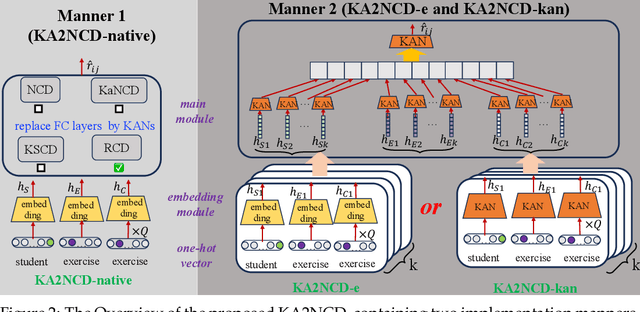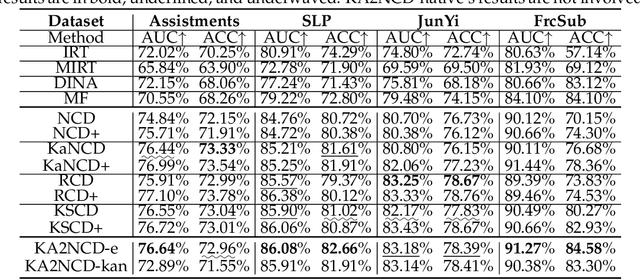Linrui Qin
Endowing Interpretability for Neural Cognitive Diagnosis by Efficient Kolmogorov-Arnold Networks
May 23, 2024



Abstract:In the realm of intelligent education, cognitive diagnosis plays a crucial role in subsequent recommendation tasks attributed to the revealed students' proficiency in knowledge concepts. Although neural network-based neural cognitive diagnosis models (CDMs) have exhibited significantly better performance than traditional models, neural cognitive diagnosis is criticized for the poor model interpretability due to the multi-layer perception (MLP) employed, even with the monotonicity assumption. Therefore, this paper proposes to empower the interpretability of neural cognitive diagnosis models through efficient kolmogorov-arnold networks (KANs), named KAN2CD, where KANs are designed to enhance interpretability in two manners. Specifically, in the first manner, KANs are directly used to replace the used MLPs in existing neural CDMs; while in the second manner, the student embedding, exercise embedding, and concept embedding are directly processed by several KANs, and then their outputs are further combined and learned in a unified KAN to get final predictions. To overcome the problem of training KANs slowly, we modify the implementation of original KANs to accelerate the training. Experiments on four real-world datasets show that the proposed KA2NCD exhibits better performance than traditional CDMs, and the proposed KA2NCD still has a bit of performance leading even over the existing neural CDMs. More importantly, the learned structures of KANs enable the proposed KA2NCD to hold as good interpretability as traditional CDMs, which is superior to existing neural CDMs. Besides, the training cost of the proposed KA2NCD is competitive to existing models.
 Add to Chrome
Add to Chrome Add to Firefox
Add to Firefox Add to Edge
Add to Edge